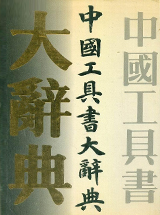
主要责任者: 徐祖友,沈益
责任方式: 编
出版者: 福建人民出版社
出版地: 福州
字数: 1444 千字
页码: 2-1277
开本: 32
装帧: 精
语种:中
定价:79.00
出版时间:1996-05
丛书多卷书否:否
书目简介:本册工具书共收录12818条词条。
被引频次:10
| 词条 | 中国工具书大辞典续编 |
| 类别 | 中文百科知识 |
| 释义 |  主要责任者: 徐祖友,沈益 责任方式: 编 出版者: 福建人民出版社 出版地: 福州 字数: 1444 千字 页码: 2-1277 开本: 32 装帧: 精 语种:中 定价:79.00 出版时间:1996-05 丛书多卷书否:否 书目简介:本册工具书共收录12818条词条。 被引频次:10 |
| 随便看 |
开放百科全书收录579518条英语、德语、日语等多语种百科知识,基本涵盖了大多数领域的百科知识,是一部内容自由、开放的电子版国际百科全书。